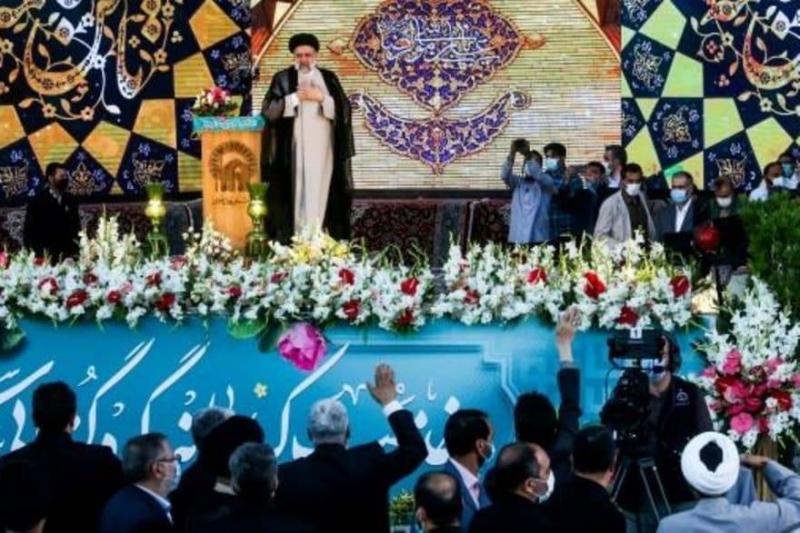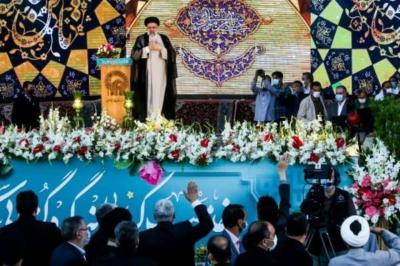On Tuesday, Supreme Leader Ayatollah Ali Khamenei announced the installation of hardline governor Ebrahim Raisi as the new President of the Islamic Republic of Iran, following his victory in the June elections. Raisi begins a term that will confront challenges posed by an economic crisis and tensions with the West, particularly regarding U.S. sanctions and nuclear negotiations.
In a speech delivered at the venue linked to the Office of the Supreme Leader in central Tehran, where the inauguration ceremony takes place, Raisi emphasized that improving his country's economic conditions would not be tied to "the will of foreigners." He stated, "We of course strive to lift the unjust sanctions, but we will not link the conditions of the nation's life to the will of foreigners."
During the ceremony broadcast live on state television, the head of the Supreme Leader's office read the text of the presidential decree, which said, "Based on the people's choice, I appoint the wise man... Mr. Ebrahim Raisi as President of the Islamic Republic of Iran." Following Raisi's speech, a speech by Khamenei is expected.
Raisi succeeds moderate Hassan Rouhani, who served two consecutive terms starting in 2013 and oversaw a period of relative openness toward the West, highlighted by the 2015 Vienna Agreement concerning the nuclear program with six major powers (the United States, Britain, France, China, Russia, and Germany). The June elections saw the lowest voter turnout in a presidential election since the establishment of the Islamic Republic in 1979.
On Thursday, Raisi (60 years old) will take the oath of office before the conservative-dominated parliament, which will be followed by presenting his nominees for ministerial positions to gain the trust of the legislators. Raisi garnered about 62 percent of the votes in the first round of elections, competing without any serious rival after the exclusion of prominent figures.
"Hope for the Future"
His presidency is expected to strengthen the conservative political faction's influence within the governing bodies, following their victory in the legislative elections of 2020. Raisi expressed "great hope for the future of the country" in statements released by his office days ago, emphasizing that it is "possible and available to overcome the current difficulties and constraints."
Addressing the economic and social crisis primarily caused by sanctions, which has been exacerbated by the COVID-19 pandemic, will be Raisi's foremost task. During the 2021 elections, as in 2017 when he lost to Rouhani, he championed the cause of defending marginalized groups and fighting corruption.
Clément Therme, a researcher at the European University Institute in Italy, states that Raisi's primary goal will be to improve the economic situation by strengthening economic relationships between the Islamic Republic of Iran and neighboring countries, by "establishing an economic system that protects Iran's economic growth from U.S. political choices," and enhancing exchanges with the neighboring countries, Russia, and China.
In 2015, Iran entered into an agreement with major powers regarding its nuclear file, which allowed for the lifting of sanctions in exchange for limiting its activities and ensuring the peaceful nature of its program. However, the implications of this agreement have become almost void since former U.S. President Donald Trump unilaterally withdrew from it in 2018 and reimposed sanctions on Tehran, which negatively affected its economy.
- A Different Path from Rouhani
Over the past few years, particularly during the winter of 2017-2018 and November 2019, Iran witnessed protests driven by economic grievances, which the authorities dealt with harshly. Additionally, protests occurred in Khuzestan province (southwest) in July over water shortages, coincide with power outages in Tehran and major cities attributed by the authorities to increased demand and a lack of water resources for energy generation.
Hardline conservatives, who view the West, particularly the United States, with suspicion, often criticized Rouhani for over-relying on the outcomes of the nuclear agreement, repeatedly urging focus on local efforts to mitigate the effects of sanctions. In his final cabinet meeting on Sunday, Rouhani defended his government's record, stating, "What we did occurred in a difficult situation due to economic warfare (sanctions) and the coronavirus; this year, drought has been added to them."
Reformist economist Saeed Leylaz, close to the outgoing president, described Rouhani as "idealistic" in his relations with the West, believing it would lead to rapid solutions for all the country's problems in the near term, suggesting that Raisi would adopt a different approach.
Trust in the West is Futile
After his election, Raisi confirmed that the priority of his foreign policy would be relations with neighboring countries. He will assume office while Iran is engaged in negotiations with major powers, with indirect U.S. involvement, to revive the nuclear agreement through a settlement that would lift U.S. sanctions and bring Washington back to it in exchange for Iran returning to commitments it has rolled back since the U.S. withdrawal.
U.S. President Joe Biden, who took office after Trump at the beginning of 2021, has expressed willingness to return to the agreement. Six rounds of negotiations were held in Vienna from April to June. Iranian officials have stated that negotiations will not resume until Raisi assumes office.
Khamenei, who holds the final say on the country's high policies, noted last week that the experience of Rouhani's government demonstrated that "trust in the West is futile." Raisi, who is considered close to Khamenei, has previously stated that he would support negotiations that achieve "results" for the people but would not allow "negotiations for the sake of negotiating."
In an additional point of tension with the West, Iran faces accusations from the United States, Britain, and Israel of being behind an attack on a tanker operated by an Israeli businessman in the Arabian Sea last Thursday, which resulted in the death of two crew members. While Washington confirmed that it is "coordinating with countries in the region and beyond to reach an appropriate and imminent response," Tehran denied the allegations, warning that it would respond to any "adventure" against it regarding this matter.




